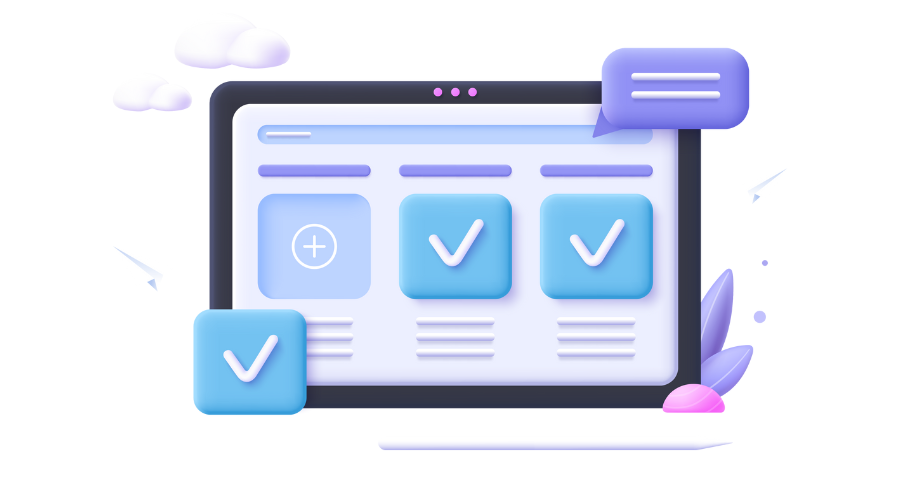Another missed deadline… Not again!
It’s a desperate and soul-crushing moment for every professional in any sphere. In fact, every second project misses the due date: 50% of projects don’t finish in a timely manner. The top three reasons are:
- Vague goals and expectations
- Utopian deadlines
- Poor task management and time allocation
Indeed, meeting deadlines is one of the biggest challenges for project managers. Nearly two-thirds (31%) report their project deadlines are unrealistic and impossible to achieve.
But even if you set an adequate (sensible) deadline, will it guarantee automatic success with the deliverables?
Doubtfully.
Setting deadlines is one thing; quite another is managing your time and tasks wisely. That’s why we’ve collected the best strategies on how to manage deadlines and project deliverables more effectively to help you tackle this challenge. Even better—we won’t leave you without tools for managing your projects and sticking to the time limits. You can pick them up at the end of the article.
But for now, go ahead and scoop up these expert tips.
Deadline Management Tips from Experts for Successful Project Deliverables
1. Transform Deadlines into Missions
Instead of dreading the deadline, gamify work and go on an exciting mission!
Missions or challenges create a more stimulating, engaging, and productive work environment as if de-stressing your projects. Note: Challenge-based gamification can boost performance by roughly 90%.
So, if you want to build a high-performing team that beats the clock, here’s your step-by-step action plan:
Step 1. Pick a theme.
Depending on your interests, take the Star Trek, Mission: Impossible, or the “Bondiana” (James Bond) spy series for inspiration.
Step 2. Determine achievement levels.
Break your project into mission phases or levels.
Step 3. Assign roles (similar to those in video games).
If you manage IT projects, these can be a Code Juggernaut (Lead Web Developer), Bug Hunter (QA Tester), or UX Alchemist (Frontend Designer).
Step 4. Generate witty names for tasks.
An extraordinary title (in line with your preferred theme) will sound like a thrilling mission, not another tedious task on your to-do list.
Step 5. Set a mission timer.
With a space theme, it can be a progress bar with a rocket slowly launching as your team members complete task by task.
Step 6. Celebrate achievements with mini-rewards.
Use celebratory sounds (let’s say, a “Mission Complete” sound effect), badges, or even framed diplomas to hang in the office and remind you of a successful deliverable.
For example:
Look at this PowerPoint Ranger badge.
Source: Instagram
2. Escape the Email Trap
Did you know that emails are the trickiest time thieves?
They literally steal your precious hours and seconds. An average employee spends 28% of the workday on emails. That’s approximately 2.6 hours (daily!) for a full-time specialist.
But the deepest pitfall?
They may entrap you and your team members into a perpetual cycle of opening and replying instead of actually doing your job. The moment you notice or hear that email notification, you immediately get distracted and run to check your mailbox. And this happens repeatedly (and even more frequently than your coffee breaks).
As a result, you can’t keep up with your deadline at the end of the workday due to these distractions. If that’s the case, you need the following time management strategy to avoid the major distractor (email) and successfully meet your project deadlines.
Peter Čuček, Owner at Tuuli, shares, “I like the idea of email power hours in the morning. Dedicate this time to dealing only with emails and never return to your inbox till the next morning, midday, or afternoon—whichever works for you.”
3. Don’t Be Afraid (or Shy) to Delegate
If you can’t manage your deadlines, simply watching them pile up, the weak link in the chain might be ineffective (or zero) task delegation. Perhaps you’ve taken on too much on your shoulders. While your to-do list is never getting any shorter, you’re getting stretched too thin.
Sean Craig, Co-Founder of Impact Society, says, “I think delegation is one of the most underrated management skills. Everyone knows what it means, but few people nail it (I didn’t at first).”
According to Craig, there are two basic reasons: you’re either “too shy to delegate” tasks or “aren’t organized” enough. He recommends, “Kick it off with a weekly review using an Eisenhower matrix.” Categorize tasks by importance and urgency:
- Important, Urgent → Do it ASAP.
- Important, Not Urgent → Schedule and do it later.
- Not Important, Urgent → Choose the best person for this task and delegate.
- Not Important, Not Urgent → Delete unnecessary tasks.
Source: PriorityManagement
Now, delegate “Not Important, but Urgent” tasks.
4. Outsource Some Tasks or Projects
Similar to delegation (at some point), outsourcing is another time management tactic often used by busy professionals. Here’s why. Managing everything in-house isn’t always the most efficient approach in terms of both time and cost.
For example:
Let’s take the SEO niche. Acquiring keyword backlinks internally can be a time-consuming task for SEO teams. That’s why many outsource it to freelancers or contractors, and 60% have started outsourcing more SEO tasks like that year-over-year.
Yet, it’s not only about a single task or two. And it’s not only about SEO: 57% of businesses outsource a part of work to increase the team’s productivity and manage deliverables more effectively.
The top outsourced business operations include:
- Software development
- Financial services (mostly accounting)
- Tech support
- Call center and customer service
- Digital marketing and advertising
For example:
The AutoTrader.ca team outsources their paid ad campaigns to contractors (on a 12-month contract).
Source: LinkedIn
5. Train Your Team to Manage Time and Deadlines
So, okay, there’s no point denying it—your staffers’ relationships with deadlines are a bit… strained. But it doesn’t mean you can’t improve them and switch from tense to worry-free deadline management.
Ace your time-management skills at work with these training types:
- Role-playing scenarios: Simulate high-pressure situations for employees to manage deadlines individually or as a team.
- Micro-learning: Organize bite-sized lessons to develop one specific skill at a time: project planning, time blocking, task prioritization, deadline tracking, stress management, etc.
- Shadowing and mentoring: Pair employees with time-management pros in your team so they can watch how they control their time and workflows.
- Corporate courses: Build a course program with online or in-person training sessions on managing deadlines and deliverables.
- Experiential workshops: Teach the hands-on art of time management.
For example:
Faurecia (rebranded to FORVIA) offers a “Time Management” course for employees as a part of the FORVIA University program.
Source: Credly
Alternatively, engage your employees in off-site time-management workshops or hire professional coaches to train your team in the office.
For example:
Imperial Auto Industries hired a certified corporate trainer to arrange a Time Management Workshop for their workers in the automotive industry. They learned about a five-minute rule, task-batching, short breaks every 90 minutes, and other things.
Source: LinkedIn
6. Reduce Work and Life Stressors
Work-Related Stress
Work-related stress is typically rooted in deadline pressure. As many as 85% of project managers are overwhelmed by projects’ tempo and timeframes, experiencing a range of feelings from burnout to apathy.
Source: Smartsheet.com
There are other reasons, too, like conflicts at work.
The solution?
Organize team-building games or activities to decrease workplace tension and battle deadline anxiety.
For example:
Northern Trust organized a “Bring Your Dog to Work” day to relieve stress via pet therapy and unite employees around common interests.
Source: LinkedIn
Non-Work-Related Stress
But then, your team members are to fight personal stress, waiting for them in the other corner of the ring. Many professionals underestimate its impact on their ability to meet deadlines and project deliverables. However, it may divert their thoughts from projects entirely.
These stressors may be:
- Personal relationship problems (e.g., a breakup or divorce)
- Family emergencies
- Physical or mental health issues
- Social isolation and loneliness
- Legal troubles
- Financial stress, etc.
Suppose you have Gen Z employees struggling to make ends meet, especially those with student debt. Of course, their minds will be occupied with how to tackle this financial problem rather than how to meet a deadline.
The solution in this case?
Consider developing a student loan repayment plan or a debt relief program to help them financially.
For example:
With employee well-being in mind, Teradata provides several helpful financial perks along with a tuition reimbursement plan.
Source: Teradata.com
7. Try Smarter Work Methodologies—Go More Agile
Are you already confidently swimming in the Agile methodology?
High five to you!
But if you’re still sitting on the fence, hesitating to dip your toes in it, you should definitely try it for smarter work management and deadline compliance.
Stanislav Khilobochenko, VP of Customer Services at Clario, remarks, “Despite its hype in software development, Agile isn’t solely for SaaS companies. Lately, agility has become a universal approach because it gives more flexibility and adaptability. You can set more efficient deadlines and tweak them on the go, whether you need to develop a new product, launch a promotional campaign, or close a deal.”
Actually, 35% of marketers using Agile across industries improve the predictability of project deadlines, and 62% notice a jump in team productivity.
Source: AgileBusiness.org
You can likewise adopt agile frameworks to manage projects and deliverables more effectively:
Thanks to Agile, you can regularly gather for sprint/iteration planning and hold retrospective meetings to look back and see what has to be changed. What if you need to re-assign task priorities or re-set several deadlines for higher performance?
Top Project Management Software to Manage Deadlines More Effectively
No more missed deadlines with Nimble. When you go Agile with Nimble, you can set different task priorities, from Low to Critical, to cope with the most pressing deadlines and avoid eleventh-hour scrambles with chaotic and stressful fidgeting.
It also lets you easily move tasks from column to column (To-Do → Doing → Done) and approach deadline management and project management overall with a hawk’s eye precision.
Manage Project Deadlines like a Pro in Nimble
With Nimble, your deadlines won’t resemble ticking time bombs anymore. They will be pleasant checkpoints on your road to project management success. It’s an all-in-one work management tool with AI-powered automation, assistance, and coaching.
And hey, you’ll get a personal AI assistant, Nimble Buddy! It can even remind you of the tasks that are due today and require immediate attention.
See how it works—try Nimble, and remove the word “late” from your vocabulary.



















